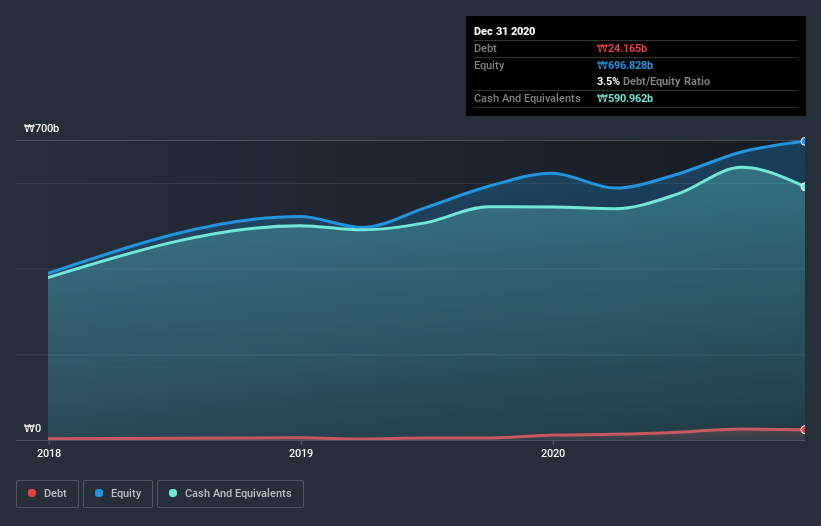Howard Marks put it nicely when he said that, rather than worrying about share price volatility, 'The possibility of permanent loss is the risk I worry about... and every practical investor I know worries about.' It's only natural to consider a company's balance sheet when you examine how risky it is, since debt is often involved when a business collapses. We note that BGF retail CO., LTD. (KRX:282330) does have debt on its balance sheet. But should shareholders be worried about its use of debt?
When Is Debt A Problem?
Debt and other liabilities become risky for a business when it cannot easily fulfill those obligations, either with free cash flow or by raising capital at an attractive price. If things get really bad, the lenders can take control of the business. While that is not too common, we often do see indebted companies permanently diluting shareholders because lenders force them to raise capital at a distressed price. By replacing dilution, though, debt can be an extremely good tool for businesses that need capital to invest in growth at high rates of return. The first thing to do when considering how much debt a business uses is to look at its cash and debt together.
See our latest analysis for BGF retail
How Much Debt Does BGF retail Carry?
You can click the graphic below for the historical numbers, but it shows that as of December 2020 BGF retail had ₩24.2b of debt, an increase on ₩11.7b, over one year. But on the other hand it also has ₩591.0b in cash, leading to a ₩566.8b net cash position.

How Strong Is BGF retail's Balance Sheet?
We can see from the most recent balance sheet that BGF retail had liabilities of ₩1.00t falling due within a year, and liabilities of ₩670.9b due beyond that. Offsetting these obligations, it had cash of ₩591.0b as well as receivables valued at ₩113.3b due within 12 months. So it has liabilities totalling ₩970.1b more than its cash and near-term receivables, combined.
This deficit isn't so bad because BGF retail is worth ₩2.87t, and thus could probably raise enough capital to shore up its balance sheet, if the need arose. However, it is still worthwhile taking a close look at its ability to pay off debt. Despite its noteworthy liabilities, BGF retail boasts net cash, so it's fair to say it does not have a heavy debt load!
On the other hand, BGF retail's EBIT dived 18%, over the last year. If that rate of decline in earnings continues, the company could find itself in a tight spot. There's no doubt that we learn most about debt from the balance sheet. But ultimately the future profitability of the business will decide if BGF retail can strengthen its balance sheet over time. So if you want to see what the professionals think, you might find this free report on analyst profit forecasts to be interesting.
Finally, a business needs free cash flow to pay off debt; accounting profits just don't cut it. BGF retail may have net cash on the balance sheet, but it is still interesting to look at how well the business converts its earnings before interest and tax (EBIT) to free cash flow, because that will influence both its need for, and its capacity to manage debt. Happily for any shareholders, BGF retail actually produced more free cash flow than EBIT over the last three years. There's nothing better than incoming cash when it comes to staying in your lenders' good graces.
Summing up
Although BGF retail's balance sheet isn't particularly strong, due to the total liabilities, it is clearly positive to see that it has net cash of ₩566.8b. The cherry on top was that in converted 149% of that EBIT to free cash flow, bringing in ₩312b. So we don't have any problem with BGF retail's use of debt. There's no doubt that we learn most about debt from the balance sheet. However, not all investment risk resides within the balance sheet - far from it. These risks can be hard to spot. Every company has them, and we've spotted 1 warning sign for BGF retail you should know about.
When all is said and done, sometimes its easier to focus on companies that don't even need debt. Readers can access a list of growth stocks with zero net debt 100% free, right now.
If you decide to trade BGF retail, use the lowest-cost* platform that is rated #1 Overall by Barron’s, Interactive Brokers. Trade stocks, options, futures, forex, bonds and funds on 135 markets, all from a single integrated account. Promoted
Valuation is complex, but we're here to simplify it.
Discover if BGF Retail might be undervalued or overvalued with our detailed analysis, featuring fair value estimates, potential risks, dividends, insider trades, and its financial condition.
Access Free AnalysisThis article by Simply Wall St is general in nature. It does not constitute a recommendation to buy or sell any stock, and does not take account of your objectives, or your financial situation. We aim to bring you long-term focused analysis driven by fundamental data. Note that our analysis may not factor in the latest price-sensitive company announcements or qualitative material. Simply Wall St has no position in any stocks mentioned.
*Interactive Brokers Rated Lowest Cost Broker by StockBrokers.com Annual Online Review 2020
Have feedback on this article? Concerned about the content? Get in touch with us directly. Alternatively, email editorial-team (at) simplywallst.com.
About KOSE:A282330
BGF Retail
Operates convenience stores under the CU brand in South Korea.
Very undervalued with adequate balance sheet and pays a dividend.
Market Insights
Community Narratives



